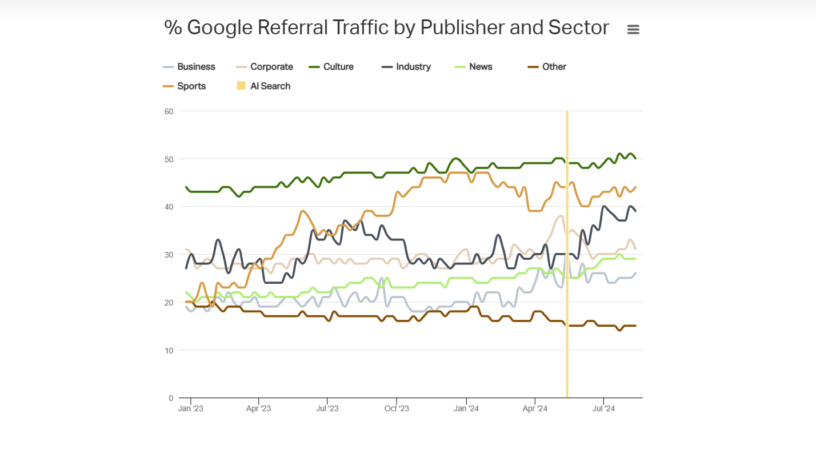Since May 2024, Google has integrated generative artificial intelligence (AI) features into its search results in the United States. This new feature, called “AI Overviews,” provides AI-generated summaries for certain queries. It has raised concerns in the SEO world: what will happen to organic traffic if users find answers without ever visiting websites (including mine 😨)?
Parse.ly conducted a study (available here) spanning 20 months of data, uncovering surprising trends far from the predicted apocalypse (phew, what a relief 😅).
Is SEO still alive?
Despite the fears shared by publishers (myself included), organic traffic from Google remains a vital source for online publishers. This is a crucial fact, especially considering that Google accounts for more than 35% of total visits for many websites (and over 50% for mine!).
Parse.ly analyzed thousands of websites to evaluate the impact of these changes. Here are the key takeaways:
- No drastic changes linked to AI. The observed traffic variations align with long-standing trends that predate the introduction of AI summaries. For instance, a general 14% decline in traffic over 20 months was noted, primarily affecting high-traffic sites.
- Google remains the key player. The percentage of traffic from Google increased by 8% over the same period. Even with the introduction of AI summaries, the search engine continues to direct users to content.
- Sector-specific disparities. Lifestyle and leisure sites benefit the most, with nearly 47% of their audience coming from Google.
AI: A threat or an opportunity?
While Google’s AI draws attention, its role isn’t to divert users away from websites but to simplify access to information. For publishers, this shift can be seen as a challenge, but also as an opportunity to optimize their strategies:
- Focus on relevance and quality. AI models, like those generating responses through SearchGPT, rely primarily on reliable and well-referenced sources. Optimized and engaging content will continue to attract traffic.
- Adapt SEO to new standards. Quality criteria—authority, expertise, and relevance—remain critical. SEO is evolving, but its fundamentals persist.
- Prepare for the rise of AI platforms. With tools like SearchGPT emerging, publishers must ensure their content remains visible within these ecosystems.
Additionally, websites offering online tools, like extendsclass.com, must now focus on providing unique resources or tools that generative AI cannot replicate. For example, an online formatter might easily be replaced by such AI, but a mock API remains beyond their scope.
The future of SEO: A transformation, not an end
The rise of AI signifies a transition, not the end of SEO. Major publishers, leveraging solid strategies and interconnected networks, have managed to stabilize their audience despite these changes.
To remain competitive, publishers must embrace this evolution: integrate AI into their strategy, create high-value content, and meet the increasing expectations of users.
The key? Seeing AI as an ally rather than a threat. As long as captivating content and curious users exist, SEO will always play an essential role in the digital ecosystem. Personally, a generative AI can’t replace a passionate blogger who conveys their enthusiasm through their pages!
Adaptation is the key to thriving in a world where AI and SEO intersect.











Leave a Reply